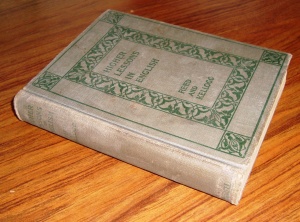I started work on a nice, long blog post this morning, then realized that I should hold onto it until July 2013 when this particular artifact will be 200 years old. (And you’ll just have to wait a few months to find out what it is!) Instead, here’s a quick look at some of the cataloging work that’s been going on ‘behind the scenes’ in the curator’s office – specifically, one of the fun things we’ve found.
 This winter’s in-depth cataloging project is books: textbooks, novels, picture books, cookbooks, and the like, owned and used by local people. We have a largeish set of textbooks from Rose K. Dawson of Rockville, including many used in the 1910s-20s at the Rockville Academy by her brothers, Walter and Joe, and by family friend William Ross. Ross, a Native American from South Dakota, came to live with the Dawsons when that family moved here in 1911; they lived at Rocky Glen, Mr. Dawson’s family home in Rockville. Ross’s story is a good one, and I’ll include more of it in a future post; for now, let’s just say that he liked to write in his textbooks. The Dawson boys did too, but Ross’s books are particularly scribbled-in. (As someone whose class notes, if not necessarily school-property books, were always covered in doodles, I sympathize.) Flipping through this copy of Higher Lessons in English: A work on English Grammar and Composition, In which the Science of the Language is Made Tributary to the Art of Expression – A Course of Practical Lessons Carefully Graded, and Adapted to Every-Day Use in the School-Room (Reed & Kellogg, 1909), one finds repeated iterations of “Bill Ross, Rockville Maryland,” the date 1919, and – fantastically – this page:
This winter’s in-depth cataloging project is books: textbooks, novels, picture books, cookbooks, and the like, owned and used by local people. We have a largeish set of textbooks from Rose K. Dawson of Rockville, including many used in the 1910s-20s at the Rockville Academy by her brothers, Walter and Joe, and by family friend William Ross. Ross, a Native American from South Dakota, came to live with the Dawsons when that family moved here in 1911; they lived at Rocky Glen, Mr. Dawson’s family home in Rockville. Ross’s story is a good one, and I’ll include more of it in a future post; for now, let’s just say that he liked to write in his textbooks. The Dawson boys did too, but Ross’s books are particularly scribbled-in. (As someone whose class notes, if not necessarily school-property books, were always covered in doodles, I sympathize.) Flipping through this copy of Higher Lessons in English: A work on English Grammar and Composition, In which the Science of the Language is Made Tributary to the Art of Expression – A Course of Practical Lessons Carefully Graded, and Adapted to Every-Day Use in the School-Room (Reed & Kellogg, 1909), one finds repeated iterations of “Bill Ross, Rockville Maryland,” the date 1919, and – fantastically – this page:
Though it seems unlikely that a teacher would chastise a student by having him write “I must keep my seat” in his textbook, even a book that the Dawsons had purchased (like this one), perhaps Ross was simply continuing his written punishment in a slightly rebellious manner, or out of boredom. Just from this one little page, I feel like the window of the past is a little clearer – always remember that our ancestors were people, not simply collections of genealogical facts. Of course, our official stance is “Don’t write in books, kids!” . . . but, actually, go ahead and write in your books. (In moderation.) Future historians may thank you!

February 27, 2013 at 1:31 pm
I’m grinning from ear-to-ear~~~! Way to go, Ross!
February 28, 2013 at 1:09 pm
I once had a professor who encouraged us to write in our books. It made them really OURS. Also, when I read a book that contains a factual error, I correct that in the margin – no matter where the book comes from.
February 28, 2013 at 5:26 pm
I like that idea – that notes in a book make them your own! 🙂
November 27, 2013 at 10:05 am
[…] to Rockville in the late 1910s to stay with the family of Hal and Fannie Dawson, and whose story I promised you back in Feburary. The Dawsons and their children lived for many years on the Pine Ridge […]